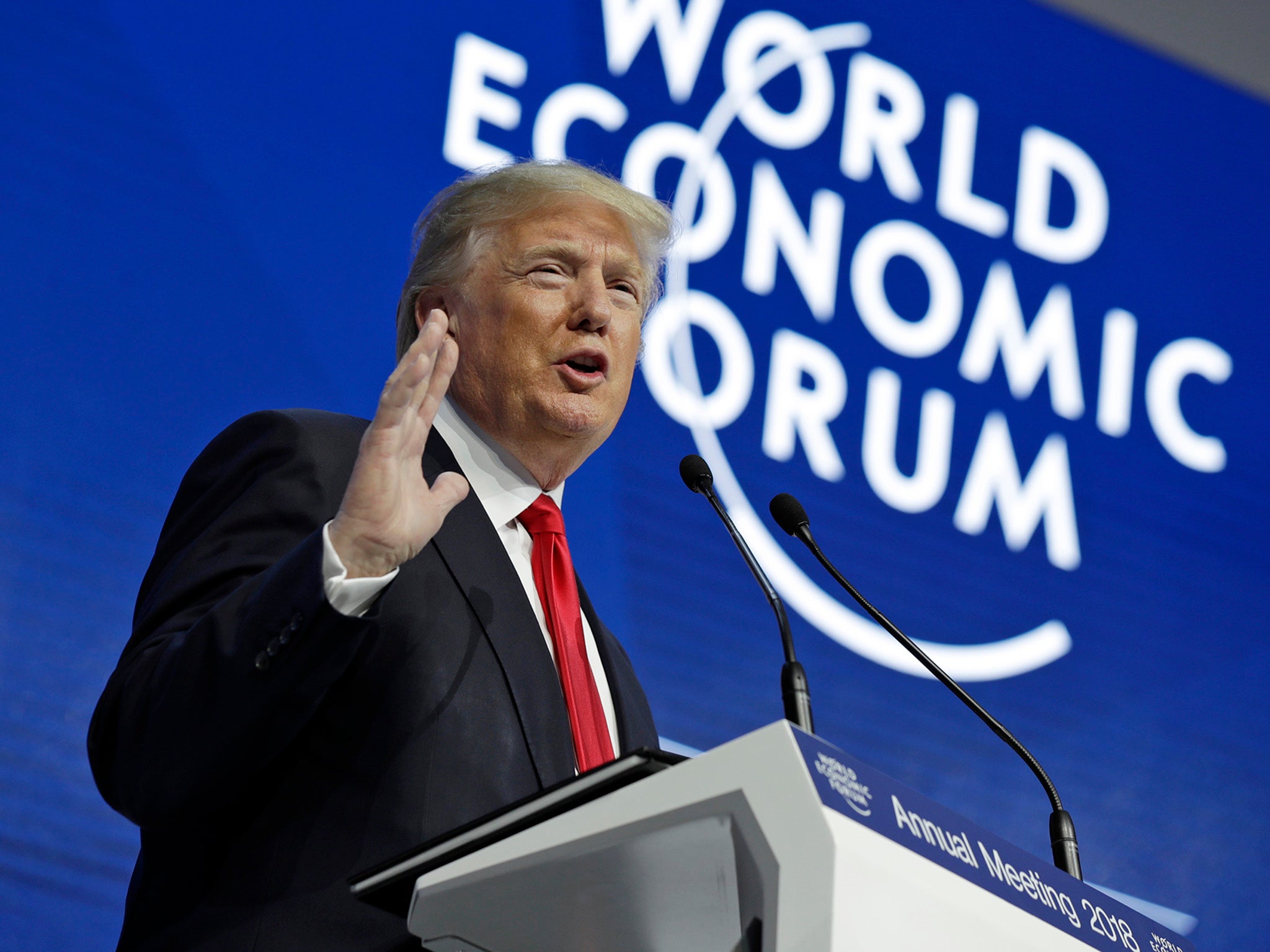President Trump’s Davos speech may have been smooth, but there are still rough times ahead
A trade war is not the answer to the huge trade imbalances between America and China

Your support helps us to tell the story
From reproductive rights to climate change to Big Tech, The Independent is on the ground when the story is developing. Whether it's investigating the financials of Elon Musk's pro-Trump PAC or producing our latest documentary, 'The A Word', which shines a light on the American women fighting for reproductive rights, we know how important it is to parse out the facts from the messaging.
At such a critical moment in US history, we need reporters on the ground. Your donation allows us to keep sending journalists to speak to both sides of the story.
The Independent is trusted by Americans across the entire political spectrum. And unlike many other quality news outlets, we choose not to lock Americans out of our reporting and analysis with paywalls. We believe quality journalism should be available to everyone, paid for by those who can afford it.
Your support makes all the difference.Before Donald Trump arrived in Davos to do his star turn at the World Economic Forum, usually a rather dry affair, it was rumoured that the President had decided to take himself, his substantial entourage and a half-dozen or so members of his cabinet after some persuasion by Emmanuel Macron. The French President, so it was said, judged that immersing the American President in a gathering packed full of globalist free-traders would civilise and tame Mr Trump.
It seems to have worked – up to a point. With the exception of a brief foray into the subject of “fake news”, Mr Trump stuck to his script and paid the usual pleasantries to the hosts and guests. His tone was soft, his words restrained, his body language relaxed: if he had been irritated by the business leaders, economists and assorted bureaucrats from around the globe, he did not show it. He was even graceful to President Kagame of Rwanda, following swiftly on from his near-apology for retweeting racist videos from Britain First. Has someone put something in the Diet Coke?
Importantly, on trade, at times Mr Trump almost sounded warm towards the idea of multilateral talks, though his set text stressed his long established preference for bilateral deals with other nations that also put the interests of their own people first. “America First” was restated as a key slogan, but tempered with the phrase “that does not mean America alone”. Seeing himself as a “cheerleader” for America, he invited chief executives to invest in America. He sounded open for much of the time.
And yet there was menace in Mr Trump’s address too, a little under the surface. Although he chose not to mention China by name, there was no doubt that it was that emerging power he was thinking of when he spoke of “predatory” trading, intellectual property theft and unfair trade practices. There was no doubt that Mr Trump is spoiling for a fight with Beijing, who he blames for the United States’ still yawning trade deficit.
Unfashionable as it may be to concede the point, Mr Trump is right to draw attention to some of China’s trading policies, and the People’s Republic has obviously pursued a policy of currency manipulation in the past to pursue its chosen economic model of aggressive export-led growth. China may have reformed its approach, but there is scope for improvement, as there is almost everywhere on the world trade scene. Mr Trump, for his part, ought to accept the simple fact that China is a better place to manufacture cheap items such as “Make America Great Again” baseball caps than high-cost America.
In any case, a trade war is not the answer to the huge trade imbalances between America and China. Such a move, inviting as it does retaliation, and with the Chinese in command of $3 trillion’s worth of mainly US Treasury bonds, the risk of a US dollar collapse – which would destabilise financial markets and economies across the planet – remains real. Mr Trump talks optimistically of the prospects for “reciprocal” bilateral trade deals, but has not yet put China at the head of the queue for such talks.
Mr Trump indulged in his usual exaggerations about the strength of American stock markets and boasted about US wages, living standards and employment – but his speech came just as the US authorities released some disappointing economic growth figures. An annualised expansion of 2.6 per cent (against an expectation of 3 per cent) is hardly a disaster or a rebuke to Mr Trump, but it underlines that international trade is a key element in maintaining the current synchronised growth across mature and emerging markets (with even Britain showing unexpected signs of post-Brexit resilience).
For decades since protectionism was abandoned after the Second World War the gradual dismantling of tariff and non-tariff barriers to trade across borders drove global growth. The world will not enjoy its present surge in economic activity for much longer if President Trump starts putting barriers up and sparks a trade war with China. Mr Trump’s mood music in Davos may have been smoother than we’re used to, but there are still rough times ahead.
Join our commenting forum
Join thought-provoking conversations, follow other Independent readers and see their replies
Comments